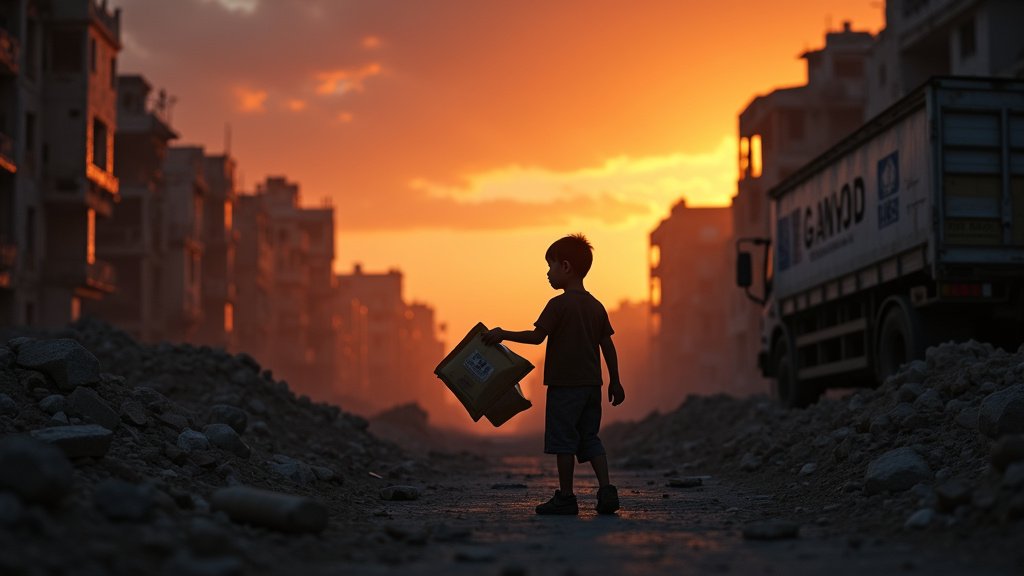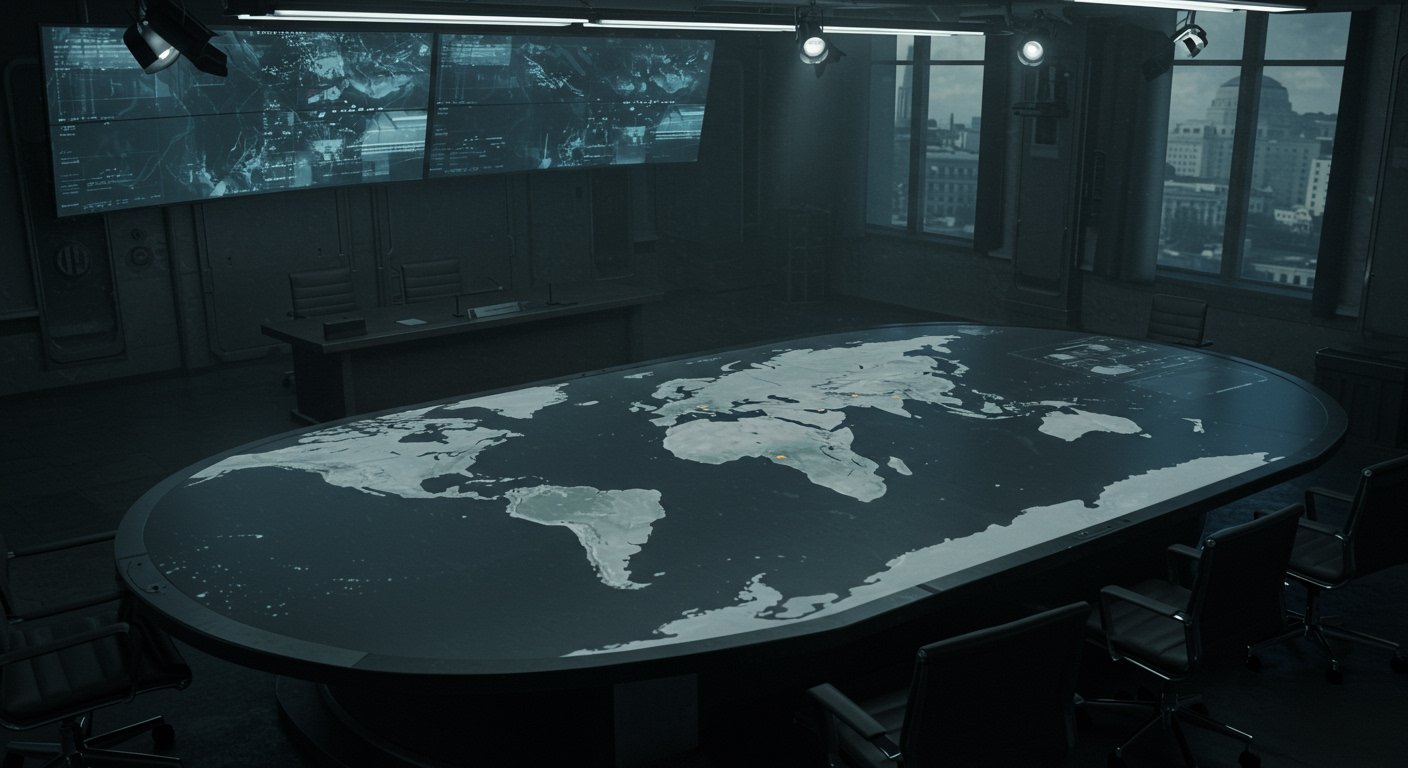GAZA CITY/BARCELONA – Israel’s military has significantly intensified its operations in Gaza City, escalating attacks that are forcing thousands of Palestinian families to flee their homes amid a deepening humanitarian crisis. Concurrently, an international aid flotilla, notably including Swedish climate activist Greta Thunberg, has set sail from Barcelona, Spain, aiming to challenge the ongoing blockade and deliver essential supplies.
Gaza City Under Intensified Assault
Israeli forces have declared Gaza City a “dangerous combat zone,” marking the initial stages of a planned offensive to seize control of the Palestinian territory’s largest urban center. Reports from the ground describe “mayhem and chaos” as airstrikes and ground operations increase, particularly on the city’s northern and southern flanks. Residents are facing intense bombardment, with reports of “scorched-earth tactics” being employed by the Israeli military. The intensification of these attacks is directly contributing to widespread civilian displacement, with families scrambling for shelter and safety amidst relentless shelling.
Recent operations have seen increased aerial bombings targeting densely populated areas, pushing an already beleaguered population into further displacement. Many residents have been forced to evacuate their homes multiple times, seeking refuge in makeshift tents under dire conditions. The Israeli military has indicated its intention to slow or halt humanitarian aid into northern Gaza as the offensive expands, a move that has drawn sharp international criticism and raised fears of exacerbating the already catastrophic humanitarian situation. The scale of the military push is aimed at seizing control of urban centers, with indications that a significant portion of Gaza City’s estimated one million residents may be displaced by the operations.
Humanitarian Catastrophe Deepens: Famine and Displacement
The intensified military actions in Gaza City are unfolding against a backdrop of a severe humanitarian catastrophe, characterized by widespread famine and starvation. Medical sources within Gaza report a grim toll, with a growing number of deaths attributed to malnutrition and hunger. As of late August 2025, health authorities in Gaza have documented over 333 hunger-related deaths, including at least 125 children. A single child in Gaza City recently succumbed to famine and malnutrition, underscoring the devastating impact of the ongoing crisis.
The United Nations has warned that famine conditions are expanding, with projections indicating that over half a million people currently face starvation. International food security experts have confirmed that Gaza is on the brink of famine, with critical thresholds being met for food consumption and acute malnutrition. Hospitals are overwhelmed, treating thousands of children for severe malnutrition, while the general population faces extreme scarcity of food, water, and essential medical supplies. The near-total collapse of essential services further compounds the suffering, creating a desperate situation for civilians trapped in the besieged enclave.
The conflict has resulted in a staggering death toll, with Palestinian health ministries reporting more than 63,371 Palestinians killed and approximately 159,835 wounded since the war began in October 2023. These figures, largely comprising civilians, highlight the immense human cost of the ongoing hostilities. The displacement crisis is equally severe, with nearly the entire population of Gaza having been forced from their homes, many multiple times, seeking safety in overcrowded and often inadequate shelters.
Global Sumud Flotilla: A Beacon of Solidarity
In a significant act of international solidarity, the Global Sumud Flotilla, a coalition of activists and organizations, has launched from Barcelona to challenge Israel’s blockade of Gaza. The flotilla, described by organizers as the largest solidarity mission of its kind in history, comprises dozens of vessels from various Mediterranean ports, carrying humanitarian aid and a message of protest against what they term Israel’s “illegal and inhumane siege.”
Swedish climate activist Greta Thunberg, a prominent figure on the flotilla’s steering committee, has voiced strong criticism of global leaders, stating they have “failed to act” to uphold international law and prevent what she described as “genocide.” Thunberg articulated that missions like this should not be necessary and that governments have a legal duty to intervene, a duty she believes they are currently betraying.
The flotilla’s stated aim is to open a humanitarian corridor to Gaza by sea, deliver much-needed aid, and symbolically break the naval blockade that has been in place since Hamas took control of the territory in 2007. Organizers emphasized the peaceful nature of their mission and its adherence to international law, drawing parallels to previous attempts to deliver aid that were intercepted by Israeli naval forces. The mission’s departure signifies a powerful symbolic challenge to the blockade and aims to draw global attention to the dire situation in Gaza.
International Condemnation and Diplomatic Pressure
Israel’s intensified military campaign in Gaza City and its overall conduct of the war have drawn widespread international condemnation. United Nations officials, including Secretary-General António Guterres, have expressed grave alarm over the escalating military operations, warning of catastrophic humanitarian consequences and urging Israel to abide by international law. Several countries, including France, Britain, Canada, and Australia, have criticized Israel’s plans and reiterated calls for a ceasefire, with some moving to recognize a Palestinian state.
Jordan’s foreign minister has called for urgent international action against Israel’s military campaign, emphasizing that unchecked aggression will deepen regional instability. He criticized the “impunity with which Israel is making a mockery of international law” and urged nations committed to human rights to follow suit. The United States, a key ally of Israel, has faced scrutiny for its continued military assistance and diplomatic support.
Meanwhile, Yemen’s Houthi movement has pledged retaliation following Israeli attacks on Sanaa that reportedly resulted in the deaths of their Prime Minister and other cabinet officials, adding another layer of regional tension. The broader geopolitical landscape sees countries like Turkey cutting off economic ties and airspace access to Israel in protest, while other nations navigate complex diplomatic balances, adjusting normalization talks with Israel in response to the escalating crisis.
A Persistent Crisis
The ongoing conflict in Gaza continues to present a devastating humanitarian crisis, compounded by intensified military operations in its major urban centers. The efforts of the Global Sumud Flotilla represent one facet of a global response, highlighting the urgent need for humanitarian corridors and an end to the blockade. As families flee and the specter of famine looms larger, the world watches, with international bodies and humanitarian organizations calling for decisive steps to end the violence and alleviate the immense suffering in Gaza. The situation remains a critical point of international focus, with repercussions felt far beyond the immediate conflict zone, making it a top item on the global news agenda.
The international community continues to grapple with the implications of the conflict, seeking pathways towards de-escalation, humanitarian access, and a resolution that addresses the root causes of the long-standing Israeli-Palestinian dispute. The current events underscore the profound human cost of the war and the persistent challenges in delivering aid and protecting civilian populations in active conflict zones.











